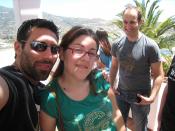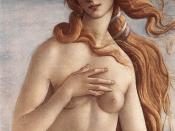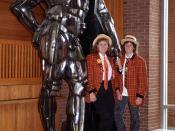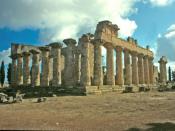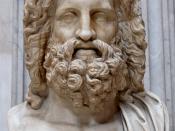There are twelve Olympian gods. They are distinguished from the rest because of their special importance. These were the most important gods and their sanctuaries often displayed votive offerings from the people who worshipped them.
Zeus (Jupiter) was the son of Cronos, and was represented as the head of Mount Olympos. He was the sky and weather god, and was naturally seen as the sender of thunder and lightning. His traditional weapon was the thunderbolt. He also sent rain, winds, and calm weather. There are numerous stories that revolve around Zeus, many of which are tales of his love affairs. Zeus had but one wife, Hera, but was the father of a number of illegitimate children with several other goddesses and mortals. When the gods have children with mortals, their children are called "Demi-Gods". This means half-gods, and they are the offspring of the couplings of a god (or goddess) and a mortal.
Their powers exceed that of mortals but are beneath that of a deity. In general, Zeus was seen as the god who saw everything, governed all, and punished all that he was unhappy with. He was intensely interested in the lives of mortals and rewarded those who showed good conduct and punished those who were evil.
Poseidon (Neptune) was the son of Cronos and Rhea, and was the brother of Zeus. He was the lord of the sea and was widely worshipped by seamen. He married the granddaughter of the Titan Oceanus, Amphitrite. His weapon was a trident which shakes the earth. He was the second most powerful god next to Zeus. It was written that he had a marvelous golden palace under the ocean and he rose forth in a chariot drawn by dolphins, sea horses, and other marine creatures.
Hades (Pluto) was also the brother of Zeus, son of Cronus and Rhea. He was the lord of the underworld and ruled the dead. He was a greedy god who always wanted more, and he favored those who would send more dead people to him. He was also the god of wealth because of the precious materials and resources mined from the earth.
Hera (Juno) was Zeus's wife and sister and queen of the Olympian gods. She was raised by the Titans Oceanus and Tethys. She was the protector of marriage and took special care of married women.
Apollo was the son of Zeus and Leto. He was the god of music, the god of the archer, the god of healing, the god of light, and the god of truth. He taught man medicine and how to shoot a bow and arrow. One of his most important tasks was to drive the sun across the sky with his chariot. He presided over religious law and communicated to man through prophets and oracles his knowledge of the future and the will of his father. No god, other than his father, awoke such dread and awe as he did. He encompasses masculine beauty, and was the averter of evil.
Artemis was the Greek goddess of wild animals and vegetation, of chastity, childbirth, and the hunt. She was the goddess of wild nature who danced with nymphs in the mountains, forests, and marshes. She was Apollo's twin, and born to Zeus and Leto. She was more at home in nature than with people, and was self-sufficient, confident, and able.
Hermes (Mercury) was the son of Zeus and Maia. He was ZeusÃÂ messenger and the fastest of the gods. He was the god of thieves and the god of commerce. He was the guide for the dead to go to the underworld. He invented the lyre, the pipes, the musical scale, astronomy, weights and measures, boxing, gymnastics, and the care of olive trees.
Dionysos (Bacchus) was a nature god of fruitfulness and vegetation, but tended to specialize as a god of wine. According to tradition, he was born at Thebes and was the son of Zeus and Semele. Dionysos also possessed the gift of prophecy and was received at Delphi by the priesthood on almost equal terms with Apollo.
Aphrodite (Venus) was best known as the Greek goddess of love and beauty. Her beauty lured all men, immortal and mortal alike. She is not the offspring of Zeus, nor is she really related to the other gods. Instead, her beginning was completely a magical creation that came out of Uranos' defeat by Cronos. Uranos was tired of all the fighting that was going on between his children, and he was most jealous of his "normal" children. Uranos began to hide them in Gaia's body until she could no longer stand the strain and begged her children to take vengeance on their terrible father. Kronos was the only one brave enough to face Uranos, and when the time was right he charged at Uranos with a curved sword and cut him. Kronos flung the blood and flesh away into the sea, and as it floated in the sea and gathered foam about it, Aphrodite was created.
Athena (Minerva) was the daughter of Zeus. It was said that she sprang from his head in full body armor and had no mother. She was the goddess of the city of Athens and only fought to protect her city and her family. She was very admirable. She invented the bridle, the trumpet, the flute, the pot, the rake, the plow, the yoke, the ship, and the chariot. She was the embodiment of wisdom, reason, and purity. It was known that she was ZeusÃÂ favorite child and was allowed to use any weapon of his she pleased, even his thunderbolt. Her favorite city was Athens and her tree was the olive tree. She was also a virgin goddess.
Ares (Mars) was the son of Zeus and Hera, and one of the Olympian deities, but his fellow gods, and even his parents, were not really fond of him. He was the god of war,or rather, the spirit of battle.
Hephaistos (Vulcan) was also the son of Zeus and Hera. He was the only god to be physically ugly even though his wife was the beautiful Aphrodite. He was the god of fire and the forge. He was very kind and peace loving. This might have to do with the fact of his ugliness to show that the Ancient Greeks associated personality with the looks and shapes of bodily figures. If someone looked mean he/she was mean, if someone looked poor that person must be poor, etc.
These are the twelve Olympian Gods. Of course there are the lesser gods which consist of numerous gods. The next link contains a list, organizing the different gods and their occupations. The subject of Greek gods was very important to the Ancient Greeks; in fact this is what they based their lifestyles on and made their decisions with. If there was ever a problem, they would turn to the gods for advice or for an answer. In Ancient Greek mythology, there existed numerous Gods; this was because the Greeks could not conceive of one god creating everything and carrying every task, so they composed their religion consisting of many gods and goddesses. If a change in religious practice was to be made, the gods themselves were the only authorities that were able to perform such a task through mediated oracles.
If you think of it now, you would say that the Greeks were too philosophical in trying to create an explanation of how the universe was formed. In my opinion, it was not a bad attempt because there never existed any prophets to teach them about religion and they never had any sacred texts to inform them about deity. This is a perfect example of how imaginative and philosophical these people actually were.
